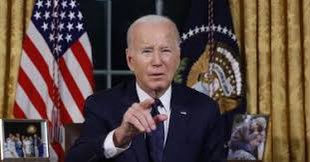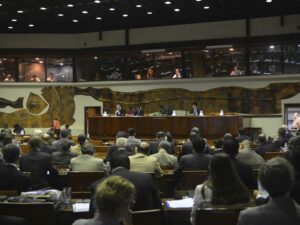
The day after pro-Palestine demonstrations on college campuses across the country turned violent as protesters forcibly occupied a building and clashed with police and counter-protesters, White House Press Secretary Karine Jean-Pierre was pressed during a May 1 briefing to state President Joe Biden’s position on the recent developments.
Her answer was a two-pronged general statement reiterating the administration’s continued condemnation of anti-semitism and hate speech and recognition of Americans’ right to protest peacefully within the limits of the law.
Pro-Palestine campus protests have become a national phenomenon from Los Angeles, California, and Austin, Texas, to Gainesville, Florida, and New York City. Those universities and their local and state law enforcement agencies have reacted to the disruptions in their own way, and the last several days have produced various results—from hundreds of arrests and forced take-downs of makeshift campsites at Columbia University to Brown University considering divesting from Israel and USC’s decision to cancel graduation ceremonies.
President Biden released his own statement on April 22, condemning the “antisemitic protests” as well as “those who don’t understand what’s going on with the Palestinians.”
Ms. Jean-Pierre told reporters that President Biden and his team are “monitoring the situation closely.” When asked why he remained silent after the recent violence, she reiterated the president’s record of fighting antisemitism as proof of his pre-established position.
“What we believe—and we’re very clear on this—is that peacefully protesting within the law is something that every American should have the right to do,” she said. “We’re also going to call out any type of anti-semitism that we are hearing, that we are seeing.”
Congressional Response to College Protests
Ms. Jean-Pierre shared the administration’s recognition of students’ right to learn and feel safe on campus and, in a reference to protesters in Columbia occupying a campus building, its belief that taking over buildings “is not peacefully protesting.”
Her comments echoed those made by White House National Security spokesman John Kirby during a call on April 30, in which he said, “The president believes that forcibly taking over a building on campus is absolutely the wrong approach. That is not an example of peaceful protests.”
However, Ms. Jean-Pierre declined to officially condemn any other aspect of the protests beyond the anti-semitism and “disruption that really takes away from student’s academic experience,” which, she also said, was being undertaken by “a small percentage of students.”
What was President Biden’s view on the tearing down of the U.S. flag by some campus protesters to raise the Palestinian flag in its place?
“Americans have the right to peacefully protest within the law—within the law. And we have to also respect that,” Mr. Jean-Pierre replied before reiterating the aforementioned views regarding “taking over buildings” and anti-semitism.
When asked for the White House’s opinion on the ways schools like Columbia University opted to handle the protests, Ms. Jean-Pierre declined to answer, deferring to the individual school’s leadership and law enforcement agencies.
“That is a decision for colleges and universities to decide on. The law enforcement … they have a better sense of what’s going on in the ground. And obviously, they have to make decisions.”
Those individual protest crackdowns have also led to reports that some of the protesters arrested on campuses were professional agitators and that some of the protests were receiving funding from outside groups.
Asked if the president was aware of the unenrolled protesters, Ms. Jean-Pierre said she could not speak to that, directing the question to local law enforcement.
The White House press secretary also declined to answer whether the president wanted his administration to find out who is funding some of the protests.
“I cannot speak to the organizations that are being reported,” she said.
Local officials would have better information on that, she said, and the Department of Justice and FBI would continue to offer support to colleges and universities “with respect to federal laws.”







